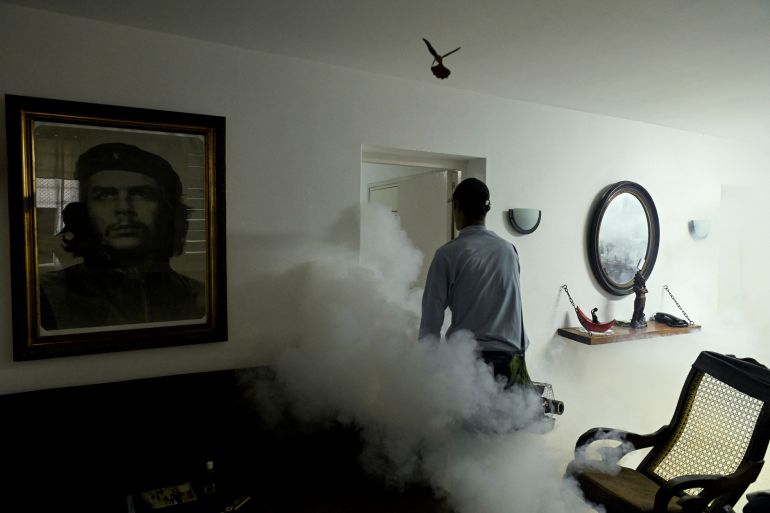Cuban authorities battle wave of mosquito-borne illnesses
Cuba’s top epidemiologist warned nearly a third of the population has been impacted and swaths of workforce sickened.

By News Agencies
Published On 14 Nov 202514 Nov 2025
Save
Cuba is battling a wave of mosquito-borne illnesses, with the country’s top epidemiologist warning that nearly one-third of the population has been impacted, with large numbers of workers taken ill.
On Thursday, fumigators armed with fogging machines probed alleys and crowded buildings in parts of the capital Havana, among the hardest hit by mosquito-borne viruses including dengue and chikungunya, authorities said.
Recommended Stories
list of 3 itemsend of list
It comes after Francisco Duran, the national director of epidemiology at the Cuban Ministry of Public Health, described the situation in the Caribbean island nation as “acute”.
“We are working intensely, as we did with COVID-19,” Duran said, referring to ongoing research projects to find medications and vaccines to help tame the virus’s impacts.
Dengue fever has long plagued Cuba, but has grown worse as the government’s ability to fumigate, clean roadside rubbish and patch leaky pipes has been hampered by an ongoing economic crisis.
The once-rare chikungunya virus – which causes severe headache, rashes and joint pain which can linger months after infection, causing long-term disability – has also spread quickly in recent months.
Chikungunya, which is spread primarily by the Aedes mosquito species that also carries dengue and Zika, has no specific treatment.
Duran said Cuban health authorities are conducting two clinical trials to test the efficacy of Jusviza, an injectable drug used to control hyperinflammation, in treating chikungunya.
He continued that another trial is under way to evaluate rectal ozone therapy as a treatment for patients with joint pain following chikungunya’s acute phase. This form of treatment involves administering ozone gas through the rectum.
Advertisement
Outbreaks of chikungunya have infected almost 340,000 people globally so far in 2025, according to the European Centre for Disease Prevention and Control (ECDC), resulting in 145 deaths in at least 16 countries. In July, the World Health Organization issued an urgent call for action to prevent another epidemic of the virus.
Cuba’s healthcare system, once among the best in Latin America, has suffered under a decades-long economic embargo orchestrated by the United States, seeking to pressure Havana’s nominally communist government into making political and economic reforms.
Citizens in the impoverished island nation routinely suffer from severe shortages of food, fuel and medicine, while the poorest are often unable to purchase insect repellent.
The issue is exacerbated by frequent power outages, which leave Cubans with little choice but to open their windows and doors to ease the heat, inviting mosquitoes in and facilitating the spread of the disease.
“The blockade is a policy of collective punishment,” Cuban Foreign Minister Bruno Rodriguez said in late October, as the United Nations General Assembly again overwhelmingly called for an end to Washington’s embargo for a 33rd year.
“It flagrantly, massively and systematically violates the human rights of Cubans. It makes no distinction between social sectors or economic actors,” he said.
